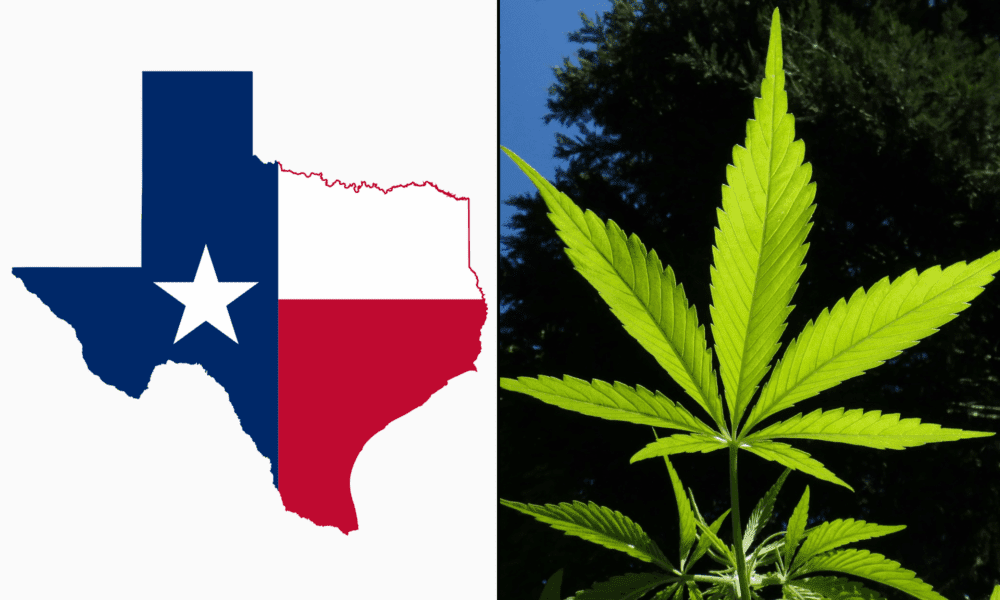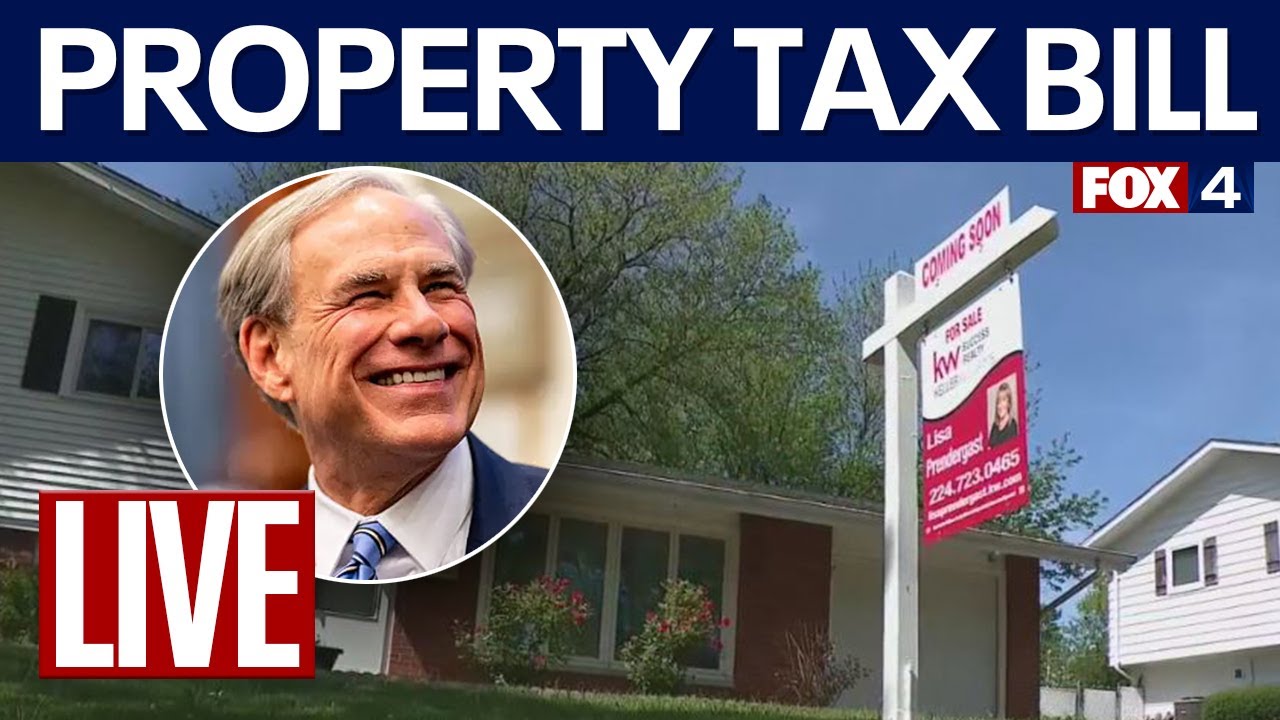featured
Texas Governor Still Won’t Say If He’ll Sign Hemp Ban Bill, But Thinks There Are ‘Meaningful’ Concerns On Both Sides Of The Debate
Published
6 hours agoon

The governor of Texas still hasn’t made a decision on a bill lawmakers recently sent to his desk that would ban consumable hemp products with any traces of THC—but he says there are “meaningful positions and concerns on both sides of the issue.”
As advocates and stakeholders continue to push for a veto of SB 3, which they say would effectively eradicate the hemp market in Texas, Gov. Greg Abbott (R) said on Monday that he has hundreds of bills to review and he “hasn’t gotten to” the cannabis legislation yet.
“I’ll tell you this: Listen, there are meaningful positions and concerns on both sides of the issue, and I’ll look into all of those and evaluate all of those,” he told reporters during a Q & A session following a bill signing ceremony for an unrelated measure.
That largely echoes comments Abbott made earlier this month, when he said SB 3 “is one of literally more than a thousand bills on my desk—all of which need my careful consideration and evaluation.”
“I will give all of those pieces of legislation the consideration and time that they deserve,” the governor said at the time, while sitting beside one of the measure’s most vocal supporters, Lt. Gov. Dan Patrick (R).
But it’s notable that, in his latest comments, he seemed to acknowledge that supporters and opponents of the measure have “meaningful” arguments that he’s taking into account.

Also this month, hemp advocates and stakeholders delivered more than 100,000 petition signatures asking Abbott to veto the measure. Critics of the bill have said the industry—which employs an estimated 53,000 people—would be decimated if the measure becomes law.
The governor has three options for the proposal: sign it, veto it or allow it to take effect without his signature. The deadline for his decision is this Sunday, June 22.
Last month, a spokesperson for the governor separately declined to disclose Abbott’s plan for the bill, saying only that he “will thoughtfully review any legislation sent to his desk.”
Texas lawmakers legalized the sale of consumable hemp in 2019, following enactment of the 2018 federal Farm Bill, which legalized the plant nationwide. That’s led to an explosion of products—including edibles, drinks, vape products and cured flower—sold by an estimated 8,000 retailers.
Military veterans advocates, including Texas Veterans of Foreign Wars, have also called on the governor to veto the hemp ban, saying it “would cause irreversible harm to communities across the state.”
Farmers have also said the prohibition would devastate a key sector of the state’s agriculture industry.
Meanwhile, a recent poll commissioned the Texas Hemp Business Council (THBC) found that Texas Republican primary voters oppose the proposal to ban hemp products containing THC.
—
Marijuana Moment is tracking hundreds of cannabis, psychedelics and drug policy bills in state legislatures and Congress this year. Patreon supporters pledging at least $25/month get access to our interactive maps, charts and hearing calendar so they don’t miss any developments.![]()
Learn more about our marijuana bill tracker and become a supporter on Patreon to get access.
—
Abbott separately signed a bill into law last week to create a state-backed research consortium to conduct clinical trials on ibogaine as a possible treatment for substance use disorders and other mental health conditions. The ultimate goal of the project is to develop the psychedelic into a prescription drug with federal Food and Drug Administration (FDA) approval, with the state retaining a portion of the profit.
Lawmakers also recently passed a bill to significantly expand the state’s medical marijuana program, sending it to the governor.
The measure would expand the state’s list of medical cannabis qualifying conditions to include chronic pain, traumatic brain injury (TBI), Crohn’s disease and other inflammatory bowel diseases, while also allowing end-of-life patients in palliative or hospice care to use marijuana.
Separately in Texas, a House committee approved a Senate-passed bill last month that would prohibit cities from putting any citizen initiative on local ballots that would decriminalize marijuana or other controlled substances—as several localities have already done despite lawsuits from the state attorney general.
Under the proposal, state law would be amended to say that local entities “may not place an item on a ballot, including a municipal charter or charter amendment, that would provide that the local entity will not fully enforce” state drug laws.
While several courts have previously upheld local cannabis decriminalization laws, an appellate court comprised of three conservative justices appointed by the governor has recently pushed back against two of those rulings, siding with the state in its legal challenge to the marijuana policy in Austin and San Marcos.
Despite the ongoing litigation and advancement of the House and Senate bills, Texas activists have their targets set on yet another city, Kyle, where they hope put an initiative before voters to enact local marijuana reform at the ballot this coming November.
A recent poll found that four in five Texas voters want to see marijuana legalized in some form, and most also want to see regulations around cannabis relaxed.
Image element courtesy of AnonMoos.

Author: mscannabiz.com
MScannaBIZ for all you Mississippi Cannabis News and Information.
You may like
-


Mississippi AG Limits Sale of Consumable Hemp Products
-


Dallas-Area Officers Raid 3 Licensed Hemp Distribution Warehouses in ‘Enforcement Overreach’
-


The Counterculture Giant Reclaims Its Roots
-


Study: Daily Cannabis Consumers Exhibit Few Changes in Simulated Driving Performance Compared to Controls
-


Oregon Officials Will Appeal Court Decision That Overturned Marijuana Industry Labor Peace Law
-


Terrabis Opening 5th Illinois Dispensary in Mundelein
featured
Dallas-Area Officers Raid 3 Licensed Hemp Distribution Warehouses in ‘Enforcement Overreach’
Published
14 minutes agoon
June 17, 2025
[PRESS RELEASE] – DALLAS, June 17, 2025 – In a troubling action by law enforcement against the federally legal hemp industry, officers raided three licensed distribution warehouses in the Harry Hines district of Dallas: Monster, Frontline Wholesale, and Cannafy Distribution. All three companies distribute fully federally compliant hemp-derived products, sold nationwide and verified by certificates of analysis (COAs) from certified laboratories. These products help thousands of Texans, including veterans, cancer patients and individuals with chronic pain.
Each product includes a QR code that links directly to its COA—a legally binding document, signed by a DEA-registered, ISO-accredited lab director, confirming that the product meets the legal requirement of less than 0.3% delta-9 THC. These tests follow validated scientific methods.
“Monster Distribution has complied with the law in every way. They relied in good faith on licensed, accredited labs to verify that the products meet all legal standards,” said David Sergi, attorney for Monster. “This raid was not based on facts. It was based on political theater. And when law enforcement acts outside its authority to deprive businesses and individuals of their rights and property, it raises serious legal concerns.”
The Texas Forensic Science Commission (FSC) has repeatedly cautioned law enforcement and prosecutors about the limitations of certain lab methodologies used in cannabinoid testing, including the improper use of gas chromatography without derivatization, which can convert nonpsychoactive THCa into delta-9 THC and produce misleading results. Despite these warnings, the state continues to build cases on questionable science.

Author: mscannabiz.com
MScannaBIZ for all you Mississippi Cannabis News and Information.
For nearly five decades, High Times stood as the unapologetic voice of cannabis counterculture. More than just a magazine, it was a platform that elevated music, politics, psychedelics, activism, and the plant itself. It was a symbol of rebellion, freedom, and community. Then came the spectacular fall, the kind that made it feel like High Times might be gone for good. Until now.
Today, High Times returns under new ownership, new leadership, and a renewed purpose. RAW Rolling Papers founder Josh Kesselman, a lifelong reader and supporter of the brand, has taken the lead in acquiring the core assets of High Times, including the magazine, the Cannabis Cup, and its affiliated media properties. Alongside him is Matt Stang, a former High Times executive and co-owner and longtime cultural operator who helped build the Cannabis Cup into a global institution. Their plan: restore the soul of a brand that shaped generations, and set a new course rooted in the values that first built it.
“I get to bring back a piece of history that has played such an important part in culture and impacted so many lives, including my own,” Kesselman said. “This feels like a dream.”
But the dream comes with real work. And a complicated inheritance.
High Times’ recent history has been anything but stable. After its 2017 acquisition by an investor group led by Adam Levin, the brand shifted its focus to aggressive expansion, launching an investor crowdfund, pursuing a public offering, and acquiring retail cannabis businesses across the U.S.
The pitch was seductive: own a piece of the world’s most iconic cannabis brand. Over 20,000 investors bought in. Many never got shares. Few got answers. And when High Times missed SEC filing deadlines and continued to accept investments, it triggered investigations. In 2023, Levin was charged with securities fraud. By early 2025, he had pleaded guilty to conspiracy.
During those years, the magazine printed intermittently, debts mounted, and a string of failed business deals drained the company’s momentum. The brand was out of cash, out of leadership, and out of time.
“It was heartbreaking,” said a former editor who asked not to be named. “We saw something we loved turned into a business plan. A bad one.”
By mid-2024, a court-appointed receiver was actively shopping the High Times trademarks, events, and licenses to the highest bidder. Among the bidders: private equity firms, dispensary groups, and even a psychedelics company hoping to rebrand the magazine entirely.
Instead, it landed in the hands of someone at the very core of Cannabis culture.
Josh Kesselman didn’t enter the cannabis space through Silicon Valley or Wall Street. His path started in Gainesville, Florida, with a head shop, a van, and a deep love for rolling papers. What began as a storefront called Knuckleheads became the launchpad for a decades-long mission: to make better papers and treat smokers with respect.

RAW Rolling Papers officially launched in 2005 and quickly gained a loyal following among people who cared about purity, craft, and culture. The product was different; unbleached, vegan, and made with a natural connection to what smokers truly wanted yet had never experienced. But what set RAW apart was the man behind it. Kesselman connected directly with the community through videos, meetups, giveaways, and support for causes that mattered. He didn’t just build a brand. He earned a following.
Kesselman’s approach made him one of the most respected figures in the space: a founder with mass reach and underground credibility. And as RAW expanded worldwide, his loyalty to the roots of cannabis culture never wavered. He didn’t exit. He reinvested. In products. In people. In the culture itself.
Josh is a character. Charismatic, outspoken, and unapologetic. A throwback to the wild inventors and idealists who once ran underground empires. People like Thomas Forçade, the outlaw founder of High Times, who launched the magazine in 1974 while smuggling cannabis and funding radical newspapers. There’s a poetic symmetry to it: two long-haired misfits, decades apart, both driven by obsession and a refusal to sell out.

Kesselman had watched from the outside as the magazine he grew up on lost its way. The voice was gone. The magazine, when it was published at all, felt like a big paid ad. Cannabis Cups had stopped.
So when the opportunity arose to acquire the assets after the brand fell into receivership, the opportunity to rebuild it felt personal. “It wasn’t about flipping something,” he said. “It was about saving something. High Times always stood for more than the plant,” Kesselman told us. “It stood for truth. For freedom. For not apologizing about who we are.” To help save High Times he brought back part of the legacy to help.
Matt Stang is no stranger to the High Times story. Starting as an intern in the late 1990s, he spent nearly two decades inside the brand, eventually rising to Chief Revenue Officer and helping expand the magazine’s reach during the early days of legalization.
But his biggest contribution was the Cannabis Cup. When he first joined, the event was still a small gathering in Amsterdam. Under Stang, it evolved into a multi-city, international celebration of cannabis culture. “It was never just about the trophies,” Stang told us. “It was about recognition. Community. Celebration.”

In 2017 the company was purchased by private equity owners. Matt vehemently disagreed with the way High Times was being turned into a private equity run business and departed soon thereafter. During his time away he watched from the sidelines as the Cup and the magazine lost their footing. “When we saw what was happening, it wasn’t just disappointing,” he said. “It was painful.”
Now, many years later Stang returns as a partner to help restore High Times to its cultural and historical importance adding, “It’s time to bring back and revive the community we built together.”
From the sound of it, new ownership plans to bring back what made High Times special in the first place. The print magazine will return in small, collectible runs with deeper stories, and a focus on quality.
The archives: including covers, articles and art will be brought back to life, too.

The Cannabis Cup is also being rebuilt with third-party judging, real transparency, and new ways for the public to participate.
“Some of the greatest times of my life happened at those Cups. And I will bring them back. They’ll be just as much fun, because that’s the point,” Kessleman said. “When you remove private equity and investors, when it’s just a couple of people trying to do something for the culture, the possibilities become limitless.”
The new High Times website will roll out podcasts, video features, and longform storytelling again, mixing veteran contributors with new voices who live and breathe the culture.
Kesselman (who has millions of followers of his own) also wants the platform to serve as a home base for the most important cannabis voices on social media, rerouting users to hidden or new accounts to keep the community connected amid shadow bans and deletions. He thinks this will help save and rebuild our fractured community because in his words, “nobody can stop the truth.”
And yes, there will be merch. Apparel. Rolling papers. All done right. All done in the spirit of keeping the platform alive without selling it out.
The road back won’t be quick. But that’s the point. “I don’t care if it takes five years,” Kesselman said. “I’d rather go slow and build something real.”
“Most importantly?” Kesselman added. “Have fun while doing it.”
We can’t help but think that if Thomas Forçade could see High Times now—passed from the suits back to the true believers—he’d be lighting a joint and saying, finally.

Author: mscannabiz.com
MScannaBIZ for all you Mississippi Cannabis News and Information.
featured
Study: Daily Cannabis Consumers Exhibit Few Changes in Simulated Driving Performance Compared to Controls
Published
2 hours agoon
June 17, 2025

Daily consumers exhibit tolerance to the acute psychomotor-influencing effects of cannabis, according to driving simulator data published in the journal Traffic Injury Prevention.
Researchers affiliated with the University of Colorado Anschutz. Medical Campus assessed simulated driving performance in a cohort of daily cannabis consumers, occasional consumers, and controls (non-users). Daily users consumed either high-potency cannabis flower or concentrates containing, on average, 78 percent THC. Occasional consumers only inhaled cannabis flower. All consumers used cannabis ad libitum for up to 15 minutes. Study participants drove on a computer simulated course 20 minutes following cannabis consumption and once again 80 minutes later.
Consistent with prior studies, daily consumers exhibited few changes in psychomotor performance compared to controls. Specifically, daily consumers demonstrated improvements in SDLP (standard deviation in lateral positioning) following cannabis ingestion. Both daily and occasional cannabis consumers reduced their speed following cannabis use, whereas those in the control group typically increased their speed.
Unlike daily users, occasional cannabis consumers exhibited minor detriments in SDLP performance following cannabis inhalation. However, these changes were not statistically significant compared to controls (whose follow up SDLP performance also deviated from their baseline).
“The relative absence of significant differences in driving performance after cannabis across participants groups was somewhat surprising, given the high THC concentration of product used, and the relatively high level of self-reported drug effect,” researchers reported. “It was notable that the daily use group who inhaled concentrates showed the least number of significant differences as compared to the control group, having little to no change in the average SDLP and speed across the three drives. The absence of decrements in driving performance (assessed by lane departures or SDLP) among the daily-concentrate group is consistent with tolerance to acute impairing effects of cannabis.”
Researchers also failed to identify any correlations between THC/blood concentrations and impaired driving performance – a finding that is also consistent with other studies. “These findings reaffirm that the presence of THC in blood is an inconsistent and largely inappropriate indicator of psychomotor impairment in cannabis consuming subjects,” NORML’s Deputy Director Paul Armentano said. Accordingly, NORML has long opposed the imposition of per se THC limits for motorists and has alternatively called for the expanded use of mobile performance technology like DRUID.
The study’s authors concluded: “Taken as a whole, these findings indicate that acute cannabis use impaired driving performance more among the participants with a pattern of non-daily use (less than 4 times per week). … The absence of decrements in driving performance in the daily use groups support a role of tolerance in mitigating acute impairment. When changes in driving performance were observed, the effect size was notably small. These findings underscore the challenges of developing standardized impairment thresholds in the presence of large inter-individual variability in driving performance, and tolerance to cannabis with daily use.”
An abstract of the study, “Impact of cannabis use on lateral control and speed: A driving simulator study,” appears online. Additional information is available in the NORML fact-sheet, ‘Marijuana and Psychomotor Performance.’
Related

Author: mscannabiz.com
MScannaBIZ for all you Mississippi Cannabis News and Information.

Mississippi AG Limits Sale of Consumable Hemp Products

Dallas-Area Officers Raid 3 Licensed Hemp Distribution Warehouses in ‘Enforcement Overreach’
The Counterculture Giant Reclaims Its Roots

Study: Daily Cannabis Consumers Exhibit Few Changes in Simulated Driving Performance Compared to Controls

Oregon Officials Will Appeal Court Decision That Overturned Marijuana Industry Labor Peace Law

Terrabis Opening 5th Illinois Dispensary in Mundelein

Texas Governor Still Won’t Say If He’ll Sign Hemp Ban Bill, But Thinks There Are ‘Meaningful’ Concerns On Both Sides Of The Debate

A Cannabis Match Made In Heaven

Vireo Growth Provides Corporate Update After Closing All Merger Transactions

Most Marijuana Consumers Oppose Trump’s Cannabis Actions So Far, But Rescheduling Or Legalization Could Bolster Support, Poll Shows

The Massachusetts Cannabis Trail: How The Fresh Connection Thrives in a Competitive Market

Interview with Anna Schwabe, PhD

Will Supreme Court take up cannabis companies’ challenge to federal prohibition? (Newsletter: June 17, 2025)

Drinks containing THC sold at gas stations. Is that legal?

Report: Jeeter is Top Pre-Roll Brand in the U.S.

Oregon Senate Passes Bill to Increase Penalties for Landowners Allowing Illegal Cannabis Cultivation

Letter to Trump Calls for Ending Federal Cannabis Arrests to Save Government Money

GOP Senators File Bill To Ramp Up Criminalization Of ‘Candy-Flavored’ Marijuana Edibles

Wisconsin Will Legalize Marijuana If Democrats Control Legislature, Governor Says, So People Can Stop Buying It Next Door In Illinois

D.C. Hemp Company Sues Feds Over ‘Unworkable Standard’ Created By Marijuana Budget Rider

Could Watertown reverse course on cannabis shops?

Colorado Healing Center Facilitates First Psilocybin Session Under Voter-Approved Psychedelics Legalization Law

5 Ways Microdosing Cannabis Can Boost Work Performance

Shop LGBTQIA+ brands and dispensaries this Pride Month

Alert: Department of Cannabis Control updates data dashboards with full data for 2023

5 best CBD creams of 2024 by Leafly

Connecticut Appoints The US’s First Cannabis Ombudsperson – Yes there is a pun in there and I’m Sure Erin Kirk Is Going To Hear It More Than Once!

Free delta-9 gummies from Bay Smokes

EU initiative begins bid to open access to psychedelic therapies
New Study Analyzes the Effects of THCV, CBD on Weight Loss

Mississippi city official pleads guilty to selling fake CBD products

May 2024 Leafly HighLight: Pink Runtz strain

Curaleaf Start Process Of Getting Their Claws Into The UK’s National Health System – With Former MP (Resigned Today 30/5/24) As The Front Man

5 best autoflower seed banks of 2024 by Leafly

Horn Lake denies cannabis dispensary request to allow sale of drug paraphernalia and Sunday sales | News

Discover New York’s dankest cannabis brands [September 2024]

Press Release: CANNRA Calls for Farm Bill to Clarify Existing State Authority to Regulate Hemp Products

Local medical cannabis dispensary reacts to MSDH pulling Rapid Analytics License – WLBT

Nevada CCB to Accept Applications for Cannabis Establishments in White Pine County – “Only one cultivation and one production license will be awarded in White Pine County”

The Daily Hit: October 2, 2024

6 best CBD gummies of 2024 by Leafly

5 best THC drinks of 2024 by Leafly

5 best delta-9 THC gummies of 2024 by Leafly

Weekly Update: Monday, May 13, 2024 including, New Guide for Renewals & May Board meeting application deadline

People In This State Googled ‘Medical Marijuana’ The Most, Study Shows

PRESS RELEASE : Justice Department Submits Proposed Regulation to Reschedule Marijuana

Press Release: May 9, STIIIZY and Healing Urban Barrios hosted an Expungement Clinic & Second Chance Resource Fair

Thailand: Pro-cannabis advocates rally ahead of the government’s plan to recriminalize the plant
Trending
-

 California Cannabis Updates1 year ago
California Cannabis Updates1 year agoAlert: Department of Cannabis Control updates data dashboards with full data for 2023
-

 Breaking News1 year ago
Breaking News1 year agoConnecticut Appoints The US’s First Cannabis Ombudsperson – Yes there is a pun in there and I’m Sure Erin Kirk Is Going To Hear It More Than Once!
-

 best list11 months ago
best list11 months ago5 best CBD creams of 2024 by Leafly
-

 Bay Smokes12 months ago
Bay Smokes12 months agoFree delta-9 gummies from Bay Smokes
-

 Business9 months ago
Business9 months agoEU initiative begins bid to open access to psychedelic therapies
-

 cbd1 year ago
cbd1 year agoNew Study Analyzes the Effects of THCV, CBD on Weight Loss
-

 Mississippi Cannabis News1 year ago
Mississippi Cannabis News1 year agoMississippi city official pleads guilty to selling fake CBD products
-

 California1 year ago
California1 year agoMay 2024 Leafly HighLight: Pink Runtz strain

